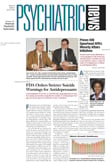Following the advice of its Psychopharmacologic Drugs Advisory Committee, the U.S. Food and Drug Administration (FDA) has told the manufacturers of 10 antidepressant medications to change their labels to include stronger, more-specific warnings regarding the possibility of worsening depression or suicidality emerging during therapy with the drugs. The agency called the new warnings prudent, even though it cautioned that no solid evidence exists to link the medications to increases in self-harming and suicidal behaviors.
Two weeks after the new warnings were issued, the agency found itself on the defensive, as two congressional inquiries were initiated into what evidence actually exists and how forthcoming the agency has been on the issue. Specifically, members of Congress want to know whether the FDA may have prevented an agency medical officer, Andrew Mosholder, M.D., from presenting all the details of his analysis of the original clinical trial data on SSRIs and suicide risk.
Mosholder’s report to the advisory committee meeting on the issue (Psychiatric News, March 5; March 19) was pulled from the meeting agenda at the last minute, according to a March 31 article in the San Francisco Chronicle, which first broke the story. Mosholder’s report allegedly indicated that the evidence linking SSRIs and suicide is much stronger than the agency has publicly acknowledged.
Rep. James Greenwood (R–Pa.), chair of the investigations subcommittee of the House Energy and Commerce Committee, along with Sen. Charles Grassley (R–Iowa), chair of the Senate Finance Committee, initiated investigations to determine what Mosholder’s original report said and whether the FDA suppressed its release, allegedly out of fear that it would put the agency at odds with the pharmaceutical industry.
An FDA spokesperson said that the agency “would review the [Congressional] requests and respond to them as quickly and completely as possible.”
Nonetheless, seven weeks after a contentious and emotional public advisory committee meeting on the risk of treatment-emergent, self-harming behaviors associated with SSRI use in children and adolescents, the FDA told physicians prescribing antidepressants to monitor carefully any patient—regardless of age—receiving one of the 10 medications for “possible worsening of depression or suicidality, especially at the beginning of therapy or when the dose either increases or decreases.”
At the February meeting, the agency’s advisory committee recommended that the FDA proceed with its proposed reanalysis of self-harming behaviors during clinical trials involving antidepressants. However, committee members also strongly felt that the need to strengthen warning language for the medications was urgent enough to change the labeling without waiting for the results of the reanalysis. The FDA has said the reanalysis, which is being done by suicidality experts at Columbia University, should be completed by mid-summer, and the agency plans to hold another public advisory committee meeting to determine whether the results support the newly strengthened warning language or whether the labeling of the medications needs to be changed further.
The medications whose labels will be changed to include the new warnings are fluoxetine (Prozac); sertaline (Zoloft); paroxetine (Paxil); fluvoxamine (Luvox); citalopram (Celexa); escitalopram (Lexapro); bupropion (Wellbutrin); venlafaxine (Effexor); nefazodone (Serzone); and mirtazapine (Remeron).
The warning language adds that “[a]nxiety, agitation, panic attacks, insomnia, irritability, hostility, impulsivity, akathisia (severe restlessness), hypomania, and mania have been reported in adult and pediatric patients being treated with antidepressants for major depressive disorder as well as for other indications, both psychiatric and nonpsychiatric. Although the FDA has not concluded that these symptoms are a precursor to either worsening of depression or the emergence of suicidal impulses, there is concern that patients who experience one or more of these symptoms may be at increased risk for worsening depression or suicidality. Therefore, therapy should be evaluated, and medications may need to be discontinued, when symptoms are severe, abrupt in onset, or were not part of the patient’s presenting symptoms.”
The new warnings also cite the possibility of a discontinuation syndrome, advising that certain medications should be tapered rather than stopped abruptly.
In a prepared statement, APA President Marcia Goin, M.D., said APA hopes the advisory and new warning language will lead to better dialogue between physicians, patients, and their families.
At the same time, Goin added, APA is concerned that publicity around the advisory may cause some successfully treated patients to stop taking antidepressants and may block other patients who need help from getting the treatment they deserve.
“Physicians and patients,” Goin said, “must work together to weigh the risks and benefits of any course of treatment.” What is needed, she added, “is more good science. We reiterate our call to the FDA to develop mechanisms to enhance access to data from clinical trials on SSRI antidepressants, including negative trials, as well as all unpublished research.”
Extensive information on antidepressant use in children, adolescents, and adults is posted online at www.fda.gov/cder/drug/antidepressants/default.htm. ▪
